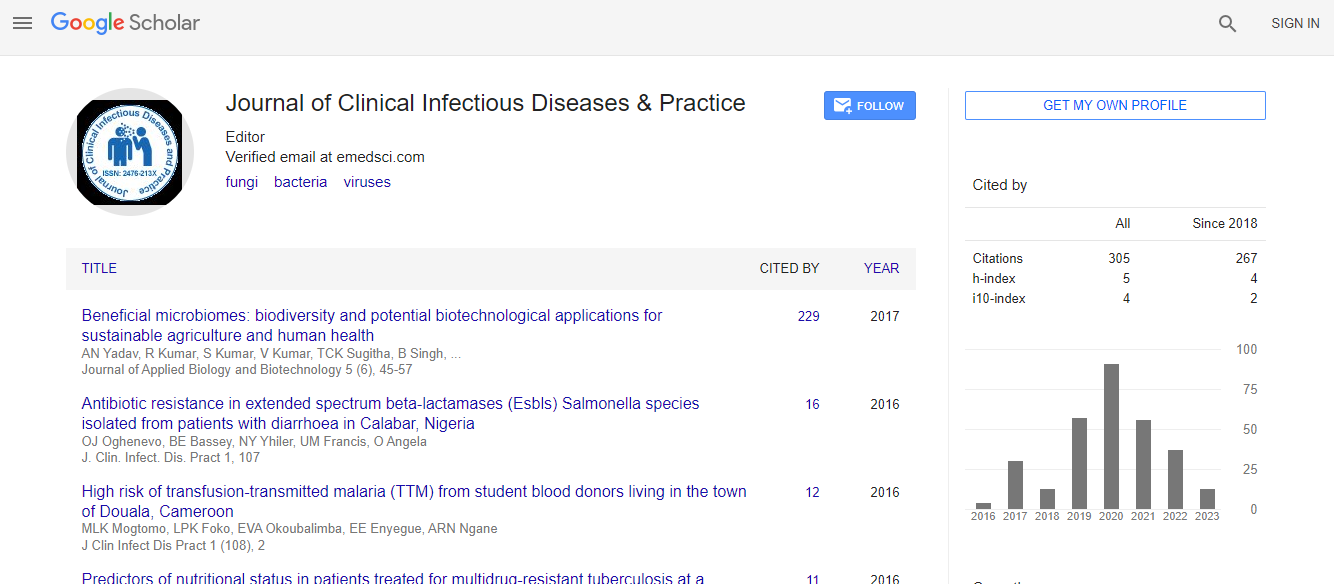Our Group organises 3000+ Global Conferenceseries Events every year across USA, Europe & Asia with support from 1000 more scientific Societies and Publishes 700+ Open Access Journals which contains over 50000 eminent personalities, reputed scientists as editorial board members.
Open Access Journals gaining more Readers and Citations
700 Journals and 15,000,000 Readers Each Journal is getting 25,000+ Readers
Google Scholar citation report
Citations : 531
Journal of Clinical Infectious Diseases & Practice peer review process verified at publons
Indexed In
- Google Scholar
- RefSeek
- Hamdard University
- EBSCO A-Z
- Publons
- ICMJE
Useful Links
Share This Page
Breast-milk deprivation and its effect in early infancy in rural coastal West Bengal
9th World Congress on Rare Diseases and Orphan Drugs
Dilip Kumar Mukherjee
Vivekananda Institute of Medical Sciences under West Bengal Health University, India
ScientificTracks Abstracts: J Clin Infect Dis Pract
Abstract
This study was conducted in a Pediatric Clinic at Kakdwip, the southernmost part of south west coastal Sundarbans, near Bay of Bengal. The main source of income is from agriculture. Majority are day-laborers while the sizeable portion of people in general among the working class is poor. Environmental sanitation is not satisfactory. The 65% are Hindus & 35% are Muslim. While conducting the clinic, it was observed that some infants often came with florid case of malnutrition-quite early in age. On enquiry it was revealed that in most of these cases, the infant were denied of breast milk and was fed with candy water instead. This evoked us to study and investigate the cases and this forms the bases of this present presentation. Frank PEM can occur in early infancy (a majority occurred within 4-12 weeks of age). This is due to denying the breast milk to the newborn and resulting in poor performance of breast milk by the mother. The reasons for not giving breast milk were-inadequate breast milk, acidity of the mother, death of the previous child in early infancy and having ‘breast milk diarrhea’. The majority incidences were on primi-para mother (53.33%) and in mothers whose age is less than 20. This is a very significant and alarming observation. These mothers who have no knowledge about infant feeding can be easily swayed and dictated by the advice of people around who advise them to stop breast milk and to start candy water, sago or very diluted formula feeds instead and thus gradually all these ultimately resulted in PEM. Thus the teenaged mothers who are physically, mentally, socially and psychologically are not competent to take individual charge of the baby are the victims. Does it signal us to raise the marriage age to 21 years at least so that the mothers become more mature, independent and capable? This study reflects the vital importance of breast milk in the feeding of newborn and early infancy and also the lack of health education of the poor teenaged mothers in rural setup.Recent Publications
1. Ashok K Patwari, Sanjay Kumar and Jennifer Beard (2015) Undernutrition among infants less than 6 months of age: an underestimated public health problem in India. Maternal and Child Nutrition 11(1):119-126.
2. M M Islam, Y Arafat, N Connell, et.al., (2018) Severe malnutrition in infants aged <6 months-Outcomes and risk factors in Bangladesh: A prospective cohort study. Maternal and Child Nutrition. e12642.
3. Marko Kerac, H Blencowe, et.al., (2011) Prevalence of wasting among under 6-month-old infants in developing countries and implications of new case definitions using WHO growth standards: a secondary data analysis. Archives Diseases in Childhood. 96(11):1008-1013.
4. M Mwangome, M Ngari, et. al., (2017) Diagnostic criteria for severe acute malnutrition among infants aged under 6 months. American Journal of Clinical Nutrition. 105(6):1415-1423.
5. Y Arafat, M M Islam, et.al., (2018) Perceptions of acute malnutrition and its management in infants under six months of age: a qualitative study in rural Bangladesh. Clinical Medicine Insights: Pediatrics.12:1-10.
Biography
Dilip Kumar Mukherjee has his expertise in growth and development from birth till maturity in longitudinal study especially in low socioeconomic group of Children in West Bengal, India. He is a Postgraduate Teacher in pediatrics with special reference in growth and development and nutrition.
E-mail: dilipmukherjee@rediffmail.com

 Spanish
Spanish  Chinese
Chinese  Russian
Russian  German
German  French
French  Japanese
Japanese  Portuguese
Portuguese  Hindi
Hindi 
